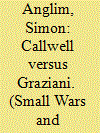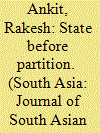| Srl | Item |
| 1 |
ID:
085522


|
|
|
|
|
| Publication |
2008.
|
| Summary/Abstract |
The period from December 1940 through to the spring of 1941 saw the British Army win a series of rapid and decisive victories over Italian and Vichy French forces in North and East Africa and the Middle East. A key feature of these operations was the extensive British use of fast-moving all-arms mobile formations utilising superior speed and mobility to out-manoeuvre considerably larger Italian formations. A number of reasons have been given for the British Army adopting this mode of warfare, but the paper contends that the best explanation is that they were an organic evolution from methods used by the British Army in 'small wars' throughout the early twentieth century, use of mobile 'frontier columns' at the operational and tactical level of war being described and recommended by Callwell himself and visible with the Army in practice in operations in India and the Middle East in particular. The inter-war period saw the combination of this model of warfare with post-First World War military technology, notably tanks, close air support and coordination by wireless. Colonial operations in this period also saw some utilisation of what would later be identified as 'Special Forces' - also used extensively in the Desert War - the most obvious example being Captain Orde Wingate's Special Night Squads in Palestine in 1938.
|
|
|
|
|
|
|
|
|
|
|
|
|
|
|
|
| 2 |
ID:
164044


|
|
|
|
|
| Summary/Abstract |
This paper is a study of the Interim Government in British India, formed during the penultimate viceroyalty of Archibald Wavell, from September 1946 to March 1947. It tries to throw light on major and minor personalities and micro and macro processes at work in this improbable interlude and, thus, probes an overshadowed ministerial and bureaucratic set-up in the lead-up to Partition. This understudied set-up constituted yet another compelling ‘space before Partition’ which would continue to affect the Indian state after Partition. Simultaneously, the paper seeks to complicate the teleology and inevitability of Partition by showing this interim arrangement at work, which belied its name. Bringing together official texts and the personal interpretations of many participants, it approaches the period as liminal, albeit one with limitless possibilities at this juncture, of which what followed in 1947 was but one.
|
|
|
|
|
|
|
|
|
|
|
|
|
|
|
|